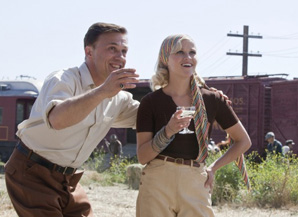Book Vs. Movie: Water For Elephants
By Russ Bickerstaff
April 27, 2011
The other end of the novel follows a much older Jacob living in a nursing home in the contemporary world. As nice and quaint as this may be, seeing what became of Jacob at the end of everything doesn’t really add anything to the story. It feels as though it may have been added merely to give the book a little bit more physical weight to it. Without the chapters featuring the older Jacob, the novel would be slightly shorter. Perhaps Gruen, or Gruen’s publisher were concerned that the novel wouldn’t seem substantial enough to readers without a few added chapters. The portions of the story that take place in the present seem a bit stilted and tacked-on.
Quaint and digestible though it may be, Water For Elephants doesn’t seem like a work of inspiration so much as it was something for Gruen to do. Though it is generously peppered with details about life in a traveling circus in the 1930s, it hardly seems to have much of a significant existence beyond that. There’s really no insight into circus life or the life of a group of performers to be found here. It ends up feeling a lot like an MFA creative writing project — develop a plot, create the characters, do the background research, tack on something about the main character when he’s older and place it throughout the book. It’s all quite nice and everything and the book feels very well-crafted, but there really isn’t much there beyond the mechanics of it. There’s really no soul beyond the basics.
The book’s lack of soul or passion in narrative drags things along from plot point to plot point with plenty of room for the requisite facts, but there doesn’t seem to be much of a joy in storytelling here. Nowhere is this more evident than the sex scene between Jacob and Marlena. The two have been longing for each other for quite some time. She has been abused by August and he’s had to put up with it. Now the two are together and... there really isn’t any passion in the narrative. Love scenes are notoriously difficult to bring to the page, but there’s definitely something missing here. While Gruen copiously avoids being too clinical or too tacky, she never manages to render the emotions in anything other than the most basic primary colors. It’s a problem that plagues the rest of the book as well.
The Movie
In principle, Francis Lawrence’s Water For Elephants covers the exact same ground as the book. The story is fluently truncated from the extended length of the book into a simple two-hour film courtesy of screenwriter Richard LaGravenese (The Horse Whisperer, The Mirror Has Two Faces.)
Robert Pattinson, of course, stars as Jacob, the veterinary student who finds he has fallen on hard times. Pattinson does a pretty good job with the basic mechanics of acting, but beyond the surface, there appears to be a great emotional vacuum. It’s not like he isn’t actually going through the emotions onscreen — he is. There isn’t enough in his performance to suggest that those emotions feel very genuine. The vacuous Pattinson is likeable enough, but there’s kind of a dead feeling about him that never seems to go away even when he’s supposed to be truly enjoying himself as Jacob. It’s a bit frustrating.
Continued:
1
2
3
|
|
|
|




